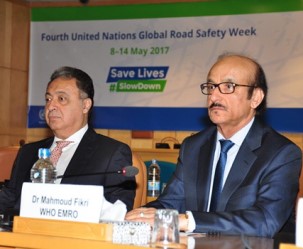 HE the Minister of Health and Population of Egypt Dr Ahmed Emad El Din Rady and WHO Regional Director for the Eastern Mediterranean Dr Mahmoud Fikri at the opening of the fourth UN Road Safety Week in the Regional Office
HE the Minister of Health and Population of Egypt Dr Ahmed Emad El Din Rady and WHO Regional Director for the Eastern Mediterranean Dr Mahmoud Fikri at the opening of the fourth UN Road Safety Week in the Regional Office
Cairo, Sunday 14 May 2017 – The World Health Organization (WHO) Regional Office for the Eastern Mediterranean and the Ministry of Health and Population of Egypt today marked the fourth United Nations Global Road Safety Week during a regional celebration held at WHO premises in Cairo. The week and its related campaign “Save Lives: #SlowDown” draw attention to the dangers of speed and the measures which should be put in place to address this leading risk for road traffic deaths and injuries. Studies indicate that typically 40–50% of drivers do not adhere to speed limits. Excessive and inappropriate speed is a key road safety risk factor, contributing to about one third of fatal road traffic crashes in high-income countries and up to half in low-income countries. Road traffic injuries continue to be a grave public health concern regionally and globally.
"Excessive speed is the main reason behind road traffic injuries,” noted Dr Fikri. "Addressing road traffic injuries has been designated as a priority area for the WHO Regional Office over the next five years with the aim of supporting countries in their efforts to reduce the number of deaths and injuries on our roads and address this key public health issue,” he added. The Eastern Mediterranean Region accounts for almost 10% of global road traffic deaths and has the second highest road traffic fatality rate in the world after WHO’s African Region. The majority of deaths occur among males and the younger and economically active age groups (15–59 years), with serious implications for health and development.
The celebration was inaugurated by Dr Fikri, WHO Regional Director, H.E. Deputy Prime Minister and Minister of Health of Lebanon Mr Ghassan Hasbani and H.E. the Minister of Health and Population of Egypt Dr Ahmed Emad El Din Rady. In addition to the opening speeches, the celebration also included speeches and testimony by Ms Lena Gebrane, Co-Founder, Kunhadi, a Lebanese nongovernmental organization advocating road safety, UN Resident Coordinator Mr Richard Dictus, Mr Afif Frigui, President, Arab Traffic Safety Organization, and Brigadier Ayman Eldabaa on behalf of General Alaa El-Degwy, Head of the National Council for Road Safety, Egypt.
In advance of the fourth UN Global Road Safety Week, 8–14 May 2017, WHO has released a new report entitled: “Managing speed”. The report suggests that excessive or inappropriate speed contributes to 1 in 3 of road traffic fatalities worldwide. The report highlights measures to address speed, prevent road traffic deaths and injuries, make populations healthier, and cities more sustainable.
Evidence has shown that a 5% cut in average speed can result in a 30% reduction in fatal road traffic crashes. It is thus imperative to strengthen efforts for speed management as part of a comprehensive safe system approach to achieve road safety-related goals of the Decade of Action of Road Safety 2011–2020 and the targets of Sustainable Development Goals.
Speed management measures include:
- building or modifying roads to include features that calm traffic, such as roundabouts and speed bumps;
- establishing speed limits appropriate to the function of each road;
- enforcing speed limits through the use of manual and automated controls;
- installing in-vehicle technologies in new cars, such as intelligent speed assistance and autonomous emergency braking;
- raising awareness about the dangers of speed.
Related link
Fourth UN Global Road Safety Week 2017 Save Lives: #SlowDown
For more information:
Rana Sidani
Senior Communication Officer
Mobile: +20 1099756506
E-mail:
Cette adresse email est protégée contre les robots des spammeurs, vous devez activer Javascript pour la voir.



